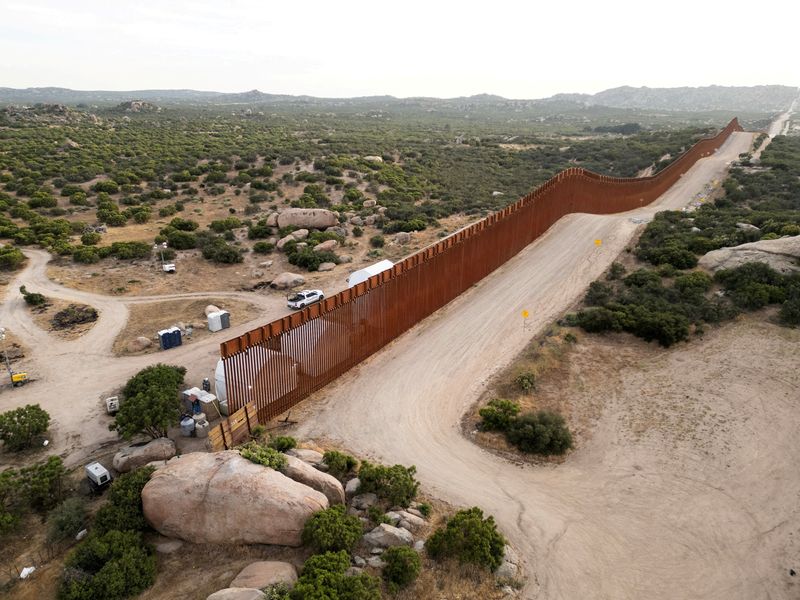
Biden imposes sweeping measures to bar migrants from asylum at Mexico border
By Ted Hesson and Mica Rosenberg
WASHINGTON (Reuters) -Migrants caught illegally crossing the U.S.-Mexico border could be denied the chance to claim asylum and quickly deported or turned back to Mexico under new restrictions announced on Tuesday, part of a sweeping enforcement effort by U.S. President Joe Biden.
The new measures will take effect immediately and will have exceptions for unaccompanied children, people who face serious medical or safety threats and victims of trafficking, a senior official said on a call with reporters.
Biden, a Democrat, has toughened his approach to border security as immigration has emerged as a top issue for Americans in the run-up to Nov. 5 elections where he will face Republican Donald Trump, who has vowed a wide-ranging crackdown if reelected.
Biden took office in 2021 vowing to reverse some of Trump’s restrictive immigration policies but grappled with record levels of migrants caught crossing illegally, a trend that has strained U.S. border authorities and cities receiving new arrivals.
The new deterrent measures “will significantly increase consequences for those who cross the southern border unlawfully,” the official said, requesting anonymity as a condition of the call.
The new asylum restrictions are not permanent, the U.S. official told reporters. They are activated when the daily average of border arrests tops 2,500 over a week and will be paused when arrests drop below 1,500 per day, the official said.
The last time crossings fell to that level was in the early months of the COVID-19 pandemic in July 2020 when global travel was at historic lows. U.S. border arrests averaged 4,300 per day in April, according to the most recent government statistics available.
Key operational questions about how the new measures will be implemented remained unclear, however, including how the administration would quickly deport migrants from far-away and uncooperative countries and how many non-Mexican migrants Mexico would accept under the new enforcement regime.
The new restrictions resemble similar policies implemented by Trump and use a legal statute known as 212(f) that served as the underpinning for Trump’s travel bans blocking people from several majority-Muslim nations and other countries.
The new restrictions are expected to trigger legal challenges from immigrant and civil rights groups who have criticized Biden for adopting Trump-like policies and backtracking on U.S. legal obligations to asylum seekers.
“We intend to sue,” said Lee Gelernt, an attorney for the American Civil Liberties Union who helped block Trump-era asylum restrictions. “A ban on asylum is illegal just as it was when Trump unsuccessfully tried it.”
When it comes to immigration policy, registered voters prefer Trump over Biden by a 17 percentage point margin, according to a Reuters/Ipsos poll conducted in mid-May.
The measures were attacked from both sides of the political spectrum.
In advance of the announcement, Trump’s campaign issued a statement criticizing Biden for high levels of illegal immigration and said the move to exempt unaccompanied minors would encourage child trafficking.
Republicans criticized Biden’s new restrictions as politically motivated and insufficient, while some Democrats slammed Biden for undercutting access to asylum and embracing a Trump-like approach.
“President Biden has undermined American values and abandoned our nation’s obligations to provide people fleeing persecution, violence, and authoritarianism with an opportunity to seek refuge in the U.S.,” said Senator Alex Padilla, a Democrat from California.
INACTION IN CONGRESS
Biden has pushed unsuccessfully for months to pass a Senate bill that would toughen border security, including with a provision that resembles his latest moves by executive action. The bill was crafted by a bipartisan group of senators but Republicans rejected it after Trump came out in opposition.
“Legislation is still the only way to permanently address border security and immigration reform,” White House deputy press secretary Andrew Bates said in a memo on Tuesday.
The number of migrants caught crossing the U.S.-Mexico border illegally dropped in recent months, a trend U.S. officials partly attribute to increased Mexican enforcement.
Claudia Sheinbaum was elected as Mexico’s first female president in a landslide victory on Sunday and will take office on Oct. 1. Biden’s border restrictions could put pressure on Sheinbaum, the successor to current President Andres Manuel Lopez Obrador, to keep illegal border crossings down.
Lopez Obrador said at a daily press conference that he expected to speak with Biden over the phone as soon as Tuesday and that the countries “have been making good progress” on the issue of immigration.
Under the new measures, migrants who demonstrate a fear of being returned to their home countries will be screened for other types of humanitarian protection but could be deported if denied, the Biden official told reporters. Those who are removed will face at least a five-year bar to reentry and potential criminal prosecution.
“These steps will strengthen the asylum system, preventing it from being overwhelmed and backed up by those who do not have legitimate claims,” the U.S. official said.
However, Enrique Lucero, the director of migrant affairs in Tijuana, Mexico — across from San Diego, California — warned the new measures could overwhelm migrant shelters as more people will be stuck waiting or returned.
The Biden administration has taken a number of steps over the past year to toughen the asylum process, including issuing a regulation in May 2023 that heightened the standard for an initial asylum claim.
Biden officials have said the effectiveness of U.S. enforcement is limited by a lack of resources in the absence of more funding from Congress.



